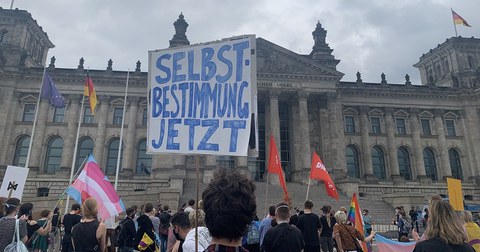Digital Demonisation: LGBT Rights and the Struggle for Democracy

Selbstbestimmung jetzt social
This project develops an analytical framework through which to understand the processes by which minorities are demonised in political and media discourse. The demonisation of minorities – such as queer and trans people, migrants and refugees, or disabled people – plays a key role in public discourse where it often works to drive and legitimise political projects of democratic backsliding, the undermining of rights, and the erosion of social welfare systems (Castro Varela and Mecheril, 2016; Tyler, 2022). In the digital age, this process of demonisation has gained increased power through new media technologies, post-truth politics, and the spread of conspiracy theories (Reddi, Kuo & Kreiss, 2021; Banaji and Bhat 2021; Fuchs 2022).
This project analyses how the demonisation of minorities operates in digital discourse through a focus on LGBT rights, in particular, those of trans people who have become the subject of heated and often hostile media discourse over the last few years (Hark and Villa 2015; Patternote and Kuhar 2017; Peirce, Erikainen and Vincent 2020). It will examine how trans and gender nonconforming people have been represented in digital media spheres in Germany and the UK over the last decade. As a case study, this project will look at how political suggestions to change self-identification laws in both countries have led to often hostile and demonising debates that have little to do with the actual legal changes proposed, the existing research on the issue, or the concerns and questions around self-identification that need to be addressed. Instead, these discourses tend to operate as part of a wider stigmatisation and demonisation of trans and other LGBT subjects that drive right-wing nationalist politics and democratic backsliding in Europe and across the globe.
Through this case study, the project will develop a wider framework for how processes of demonisation operate in digital media by focusing on three levels:
- Digital architectures and networks – which digital networks do these forms of demonisation operate through?
- Political ideologies and discourses – what political discourses and networks are created and reproduced in this process?
- Affect and emotion – what affects and emotions drive processes of digital demonisation?
Through this analysis, the project will not only shed light on the ways in which LGBT discourses are key to animating anti-democratic politics across different national contexts today but also provide a wider framework for understanding the demonisation of minorities in digital culture today. The project is a collaboration between Dr. Michelle Pfeifer at the Chair for Digital Cultures, TUD, and Dr. Billy Holzberg at the Centre for Public Policy Research at King’s College London and is funded by the transCampus strategic partnership.
